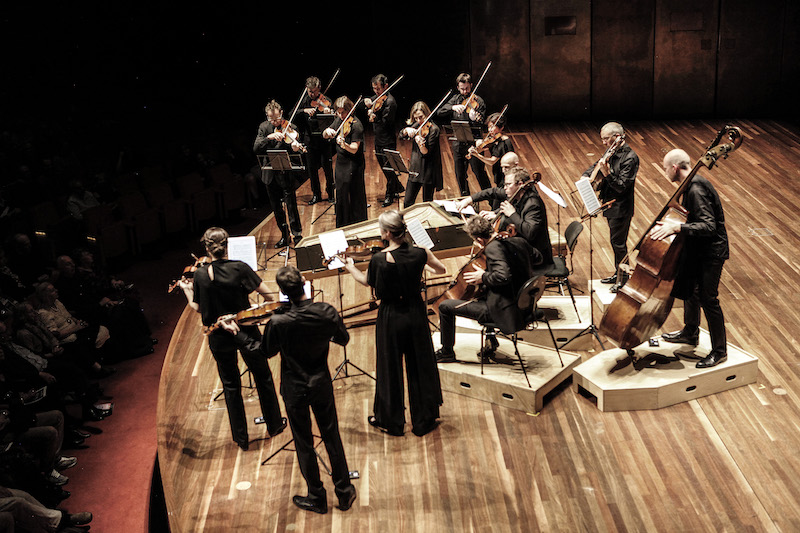Hamer Hall, Arts Centre Melbourne
August 5, 2018
Bach’s Goldberg Variations have long been the stuff of legend. The earliest of these legends was spread by one of the composer’s early biographers, Johann Nikolaus Forkel, who claimed the variations were written for Johann Gottlieb Goldberg to play in an effort to soothe the insomnia of his employer, Count Keyserling, a Russian ambassador. Forkel also contends the count paid Bach for the music with a golden goblet filled with money. It all seems highly unlikely: Goldberg was only 14 at the time of the music’s publication and the count’s name does not appear on the title page of the music.
 The Australian Chamber Orchestra. Photo © Julian Kingma
The Australian Chamber Orchestra. Photo © Julian Kingma
The aura of mystery surrounding the Goldbergs was further enhanced last century by the Canadian pianist, Glenn Gould. Gould’s two recordings have often been the first (and sometimes only) experience listeners have had of this marvellous work with its aria and 30 variations. Gould played an important role in reviving the popularity of the work which prior to his own landmark 1955 recording had first been recorded on harpsichord in 1933 and on piano in 1947. Gould’s razor-sharp articulation and dazzling speed would have come as a breath of fresh air at the time, but it is has often left people thinking that this is the final word on the subject.
In fact, there are countless arrangements of the Goldbergs and the one by Canadian early music conductor, Bernard Labadie for string orchestra and continuo is a perfect fit with the resources of the ACO. Labadie’s arrangement is broadly respectful of Bach’s soundworld and aims for textural clarity rather than revolutionary touches. A pizzicato bass fugue subject is about as outré as it gets.
The ACO brought its customary verve to this arrangement in which there was plenty of variety of texture. It was good to see the numerous solos shared around and hear them dispatched with unwavering enthusiasm, making this a truly excellent demonstration of the individual and collective talent of the orchestra.
Set pieces such as the Gigue (Variation 7) and the Overture (Variation 16) were well characterised tuttis. The responsive continuo group consisted of Erin Helyard on harpsichord, Axel Wolf on theorbo together with principal cellist, Timo-Veikko Valve. ACO director, Richard Tognetti brought admirable tone and line to the famous aria that bookends the variations, gently propelling the ornamented melody forward in its first appearance and giving it a sense of quiet valediction at the close.
The first half of the concert opened in a rather different musical sphere, with Stravinsky’s early Three Pieces for String Quartet. These rather static, eerie utterances with their drones and ostinatos seem very close to the world of the Bartók quartets and it would be interesting to speculate as to who cribbed from whom. The Stravinsky morphed seamlessly into “Nightfalls”, the first movement of Four Quarters by Thomas Adès, another spectral and nocturnal work, chosen to evoke the sleeplessness of Count Keyserling.
Some light and lightness came with Tognetti’s arrangement of Canons on a Goldberg Ground. This work is derived from the 14 canons found inscribed in the back of Bach’s personal copy of the Goldbergs, discovered in 1974. Tognetti’s irenic and epigrammatic approach works well and responds to a variety of Bach arrangers including Loussier, Stokowski and Kurtág. Tognetti’s arrangement was first performed on an ACO tour five years ago with the American pianist, Jeremy Denk. On this occasion, Erin Helyard was at the piano, effectively contributing to this genially postmodern take on Bach.
Given that Tognetti and the ACO have had some “curious” encounters with Bach in the past (just think of the wacky arrangement of the Ricercar à 6 from The Musical Offering in last year’s Emmanuel Pahud concert) it was good to hear the orchestra simply revelling in the joyful complexities of one of Bach’s great masterpieces. No other agenda required – except, perhaps a good night’s sleep.
ACO’s Goldberg Variations tours the country until August 16











Comments
Log in to join the conversation.